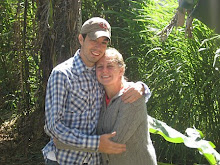Jenny´s had too much time to think...
The other day I was thinking...why is it so much easier teaching here than in the states? Is it because there are 2 of us in the classroom? I do think that this has a lot of do with it, but not everything. So what else is it? I think it is so much less stressful teaching here. Maybe it´s because I´m a volunteer and I don´t have to deal with any political issues? Once again, yes, but this isn´t a big problem in the US, so it doesn´t really count. So really, why?
Then I got to thinking.....wait, I know nothing about most of my students, much less their names. But neither does anybody else. In the states, we are encouraged to find out why Student A is sleeping during class, why Student B doesn´t do his homework, why Student C is such a spaz, and why Student D copies incorrectly from the board. This is something here that teachers don´t worry about! However, I still do. Sometimes I´ll make comments to my counterpart, Hey did you know that Student B who never does his homework has a job and works all afternoon/evening? And he´ll say....mmmmm. Like, and your point is.....??? I realized that here, the teachers don´t think of this as part of their jobs. Well, I guess, because it´s not.
Some of this makes my life a lot easier. We can treat all students as equals. But the truth is, they aren´t. Why should 2 students who grew up in the states be judged on the same scale as the rest of the students in English class? Since nobody is diagnosed with learning disablities, that must mean that nobody has one, right? WRONG! It is amazing the amount of students who can not copy off the board without their papers looking totally crazy and illegible. But what do we do to help these students succeed? Nothing.
In the states, the schools are really different. Teachers are expected to be part of a committee, hall moniters, lunch moniters, homeroom leaders, counselors, motivators, and more. I realize that only the teachers that really care do the counseling and motivating, but I really feel like that is a large portition of teachers in the US. However, here, teachers are mainly instructors. I am speaking about me as well. Here, I walk into the classroom and I give a lesson. It is up to the student to decide whether they want to learn it or not, listen or not, take notes or not. If they do or not, no me importa. I try and create lessons that stimulate and motivate my students, but beyond that, nada. In the states, I will honestly say, that kid in the back is going to learn, and really try to achieve that. Here I think, those of you paying attention will learn! Even though, sometimes just paying attention isn´t enough for some to learn.
It´s sad really. Jeff thinks that Paulo Freire would be mad. However, most teachers don´t have time here to play the other roles of a teacher. Many teachers teach at one school from 7-12. A different school from 1-6, and yet a different school all day on Saturday or Sunday. This is way to much work to be doing a good job in the classes that you have. There needs to be big changes in the structure of the eductional system to allow the instructors here to really become teachers. There needs to be more teachers, more schools, and more class time for students. I don´t think that 7-12 really cuts it. Students need to recieve more classes, and be given more opportunties for other forms of learning in groups outside of school as well, or even sports teams.
A lot of time, we hear a lot of complaining that there are no materials for teachers. And they´re underpaid. Welcome to the job of a teacher. Wherever we go, we will be underpaid! But materials, what do you REALLY need to inspire youth to learn? An imagination. Sure, some kick ass materials would help, but many times great materials go to waste because people don´t know how to use them. So maybe its better to do like we were told, to keep it smart and simple.
There is so much that really needs to be changed. But really, as a Peace Corps volunteer, what can I do? Nothing with these big, structural changes. But I can try and help teachers do the best that they can, with what is given to them. I can also help students who want to learn English, learn more. It´s a start.


2 Comments:
Great post, Jenny. I remember thinking a lot about cultural differences in ideas of accountability and responsibility when I was in Ecuador.
Have you guys read We Make the Road by Walking? It's by Freire and Myles Horton, and it's just transcripts of their conversations. I'm going to give away the ending:
Horton: I think we're done the the book then.
Freire: Yes. Let's have a drink.
It's a great book.
Keep up the thinking and reflection and passion! Remember one of my favorite quotes, "Education is the lighting of a fire, not the filling of a pail."
Jenny,
As always, you inspire me!
Kelly
Post a Comment
Subscribe to Post Comments [Atom]
<< Home